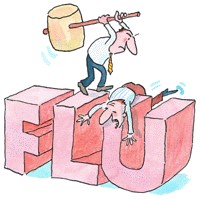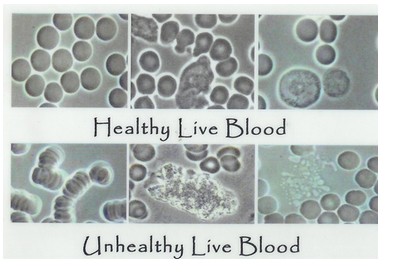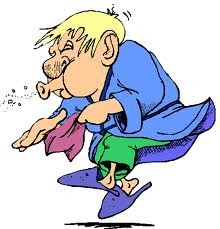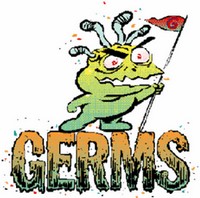Why Modern Medicine Has Failed to Come Up With Reliable Remedies For Colds and Flu
Asking the wrong question won't get you the right answer (Excerpts)
by Steven H. Home, RH (AHG)
Please visit
this page as well.
Another articl to read about
Viral Infections

Why hasn't modern science, with all its searching, found the answer to the common cold and flu? This question naturally extends to other diseases, such as cancer, heart disease, diabetes and so forth, since there are a lot of people who are asking how do I cure X disease? but haven't been coming up with answers.
Well, my answer to that is that modern medicine has found the answers to the questions they are asking. Unfortunately, they're asking the wrong questions!
Most people would never think to question their own context. So, all their ability to ask questions and reason is constricted within the container that has already been built inside their head. But, all the great discoveries of the world happen when people question not only the content of their knowledge, but also the context. That is, they break free from the confines of their culturally accepted thought patterns and perceive a new container or paradigm.
Cultural Beliefs About Colds and Flu
In talking about colds and flu, for example, let me show you some of the culturally held beliefs that are deeply ingrained in the majority of people in modern society. These widely held facts control the questions people are asking about curing colds and flu. Here they are:
1. Colds and flu are caused by germs called viruses.
2. You catch a cold or flu when you are exposed to these germs.
3. To prevent the spread of colds and flu you have to kill germs that cause them.
4. To get rid of the cold or flu, you have to kill the germs that got inside you.
5. Cold and flu germs cause us to get symptoms like a runny nose, congestion, fever, aches, diarrhea, nausea, fatigue and chills.
Curing the disease would eliminate these symptoms.
If we take the above assumptions to be true, then all the questions we would ask aboutcuring colds and flu would be asked within the context of these parameters. We would ask questions such as: How do we kill germs more effectively? And, we would find answers that would involve ways of killing germs more effectively.
But, what would happen if one or more of our basic assumptions was incorrect? (There, you see, I just asked a very interesting question, a context or paradigm busting question.)
Are Colds and Flu Caused by Viruses?
Let's start with the first assumption: Colds and flu are caused by germs called viruses. Is this really true?
Ask just about anyone the question: Who discovered germs? and they will answer Louis Pasteur, the originator of the germs cause disease hypothesis. Well, they would all be wrong because Pasteur did not discover germs. A contemporary of his, Antoine Beauchamp, was the real discoverer of microbes. Pasteur plagiarized Beauchamp's research and claimed it as his own.

Furthermore, the actual discoverer of germs, Beauchamp had a different theory about the relationship of germs to disease. His theory was that germs inhabited diseased tissue. In other words, the tissue became sick and then the germs moved into the sick tissue. This is called the biological terrain theory of disease. It is the idea that germs are not the primary cause of disease, weakened tissue is.
So, the germ theory is only that, a theory. The biological terrain model is another theory. Which one do you believe? That's important, because your belief will form a context that will shape the questions you ask.
For example, if Pasteur was wrong and Beauchamp was right, then the assumptions above are automatically invalidated because they are reasoning that arises from the context of the germ theory. If germs don't cause disease, then you could not catch a cold or flu by being exposed to germs and killing germs would not prevent the spread of colds or flu. Also, trying to kill the germs after you got infected would also be an ineffective approach.
Why l Believe the Germ Theory is Wrong
I personally reject the germ theory and believe in the biological terrain theory of disease. Although I talk about viruses and infection and all that stuff sometimes, it's only a way of communicating with people who believe that paradigm. I really don't believe that any yeast, bacteria, virus or parasite is the cause of any disease. They may be involved in a disease process, but they are not the cause.
Here is why I believe the biological terrain theory.
First, there are other noted researchers who accept this theory. For example, another contemporary of Pasteur who believed in Pasteur's theories and researched them was Rudolf Virchow. According to Henry Bieler, M.D., in his book,
Food Is Your Best Medicine, Virchow stated on his death bed, If I could live my life over again, I would devote it to proving that germs seek their natural habitat__diseased tissue__rather than being the cause of disease; e.g. just as mosquitoes seek stagnant water, but do not cause the Water to become stagnant.
Other authors have claimed that Pasteur himself made a similar statement at the end of his life, saying that he was wrong and Beauchamp was right. If this is true, then Pasteur rejected his own theory
Busting Another Assumption
There are a jot of natural healers who agree with the biological terrain concept of disease. However, I mentioned a fifth assumption, which is that the runny nose, fever, coughing, vomiting, diarrhea, skin eruptions (as in chicken pox or measles), etc. are caused by the disease. The day I began to question this assumption and discovered another way to look at the situation was the day I started being able to find effective remedies for colds and flu.

This understanding came while reading Samuel Thomson's New Guide to Health. Thomson said that he considered the learned doctors to be wrong in considering fever a disease or an enemy. Heat, he maintained, was life, and therefore, the fever was a function of the body fighting the disease, not a function of the disease. He said that bodies get cold when they die, so heat was an expression of the life process, not the disease process that leads to death.
When I read this, a question arose in my head and I thought: do dead bodies cough, get runny noses, break out in rashes, throw up, etc.? Since they don't, all of these symptoms must be created by the process of life in the body. In other words, they are the body's efforts to heal itself, not part of the sickness.
This was a radical thought for me, and part of the development of the furnace analogy we use in many of our courses. The bottom line is that if this assumption is correct, then anything we do to relieve symptoms is actually suppressing the life process in the body and interfering with healing. What we want to do is support the life process instead of fighting it.
This concept totally changes the way we select remedies. For instance, a lot of people use Goldenseal/Echinacea for colds. The use of these herbs for colds is born out of a modern scientific understanding of these herbs and a belief in the germ theory. Traditionally, these herbs would not have been used in this manner and I don't find them very effective for colds, either (at least not in the early stages).
Or, for another example, let's look at that drippy, runny nose. What is happening? The body is trying to flush an irritant, but because most people think the runny nose
IS the disease, the question in their mind is, "How can I stop this runny nose?"
Their choice of remedies will again be based on how they can achieve that objective.
However, when one shifts perspective and sees the runny nose is part of the CURE for the cold, everything changes. Doing anything, natural or otherwise, to try to stop the runny nose is actually interfering with the cure. This is why modern medicine cannot cure the cold. Their efforts are to work against the body, not with the body.
In my own experience, the best remedies I have found for the drippy, runny nose stage of the cold are pungent herbs. Hot, spicy foods like capsicum, ginger, horseradish and mustard will actually make a healthy person's nose run. So, when I take these herbs when my sinuses are running, it accelerates what the body is already trying to do to cure the cold and I recover more quickly.
The Health Hazards of Being Germ-Phobic
Many Americans have become germ phobic. They are obsessed with killing germs. They worry about catching disease and get obsessed with disinfectants and antiseptics and so forth. But, think about hospitals for a moment. They use disinfectants everywhere. Yet, a hospital is one of the places where you are most likely to get an infection.
One of the reasons this is so is because disinfectants kill friendly microbes as well as the so-called disease germs. In the natural world, there are numerous kinds of microorganisms living side by side. These microbes keep each other in check through a natural ecological balance.

Most of us are aware of the problem that antibiotics create by killing friendly flora in the intestines. By upsetting the natural balance of microbes, people get an overgrowth of yeast and other microbes that weaken the immune system. But, the same thing happens in our environment with chemical disinfectants. We are upsetting the ecological balance. This happens on the surface of the skin, too.
Furthermore, you'll never kill all the microbes in any environment, no matter how much you disinfect things. Instead, you'll kill the microbes that are the weakest and the strongest ones will survive. So, let's say you kill 99% of the microbes and the 1 % that survive are the ones most resistant to the antibiotic or disinfectant. You do this again and again and pretty soon you have genetically selected and bred super microbes that are antibiotic and disinfectant resistant. Where are these super bugs most likely to be found? In hospitals, of course!
The problems we have just mentioned are well-documented. This is not off the wall stuff, but I want to take it one step further. Are there really good and bad bacteria? You see, I have this sort of naive belief that God made everything for a good purpose. For example, flies play an important role in nature they are scavengers who eat garbage and recycle it in nature. They may be annoying, but without them, the world would soon be covered in filth.
Microbes, too, have roles to play in nature. Some make minerals bioavailable to plants, while others take dead matter, break it down and recycle it. All microbes have a purpose! The so-called disease germs are scavengers, like flies, which feed off dead tissue. No decaying tissue, no disease germs.
Also, the obsession with disinfectants and antibiotics has another side effect. We start with tissue that became weakened through toxicity or malnutrition. A sort of internal swamp or garbage pile was created. Scavenger microbes, the kind that feed on dead and decaying material, settle into the area because it's a host environment for them.
The body tries to flush out both the diseased tissue, microbes and microbial toxins through an immune response that creates symptoms like fever, runny nose, coughing, etc. We take toxic drugs to suppress these efforts, thus preventing the body from eliminating the problem. We then kill the scavenger microbes with antibiotics and antiseptics that act as chemical poisons. These further weaken our tissues, creating more breeding grounds for scavenger microbes and the cycle goes on an on. Acute disease develops into chronic disease as the body becomes more and more toxic and the tissues become weaker and weaker.
Getting the Question Right
It took a change of thinking to get well. I came to realize that it was not about treating disease at all. It is about building health. The amazing thing is that the body is designed to heal itself. However, it needs some proper tools to work with, such as positive mental and emotional attitudes, good nutrition, deep breathing, cycles of rest and exercise and an avoidance of toxic substances that will interfere with its functions.
In other words, I had to change the question I was asking from: How do I cure X? to How do I become healthy? As Samuel Thomson stated: That same thing which will cure disease will prevent it. This is the great secret that most people are missing. It is not about curing anything it is about building health.
We attract what we think about. So, when you are asking the question:How do I cure X disease? What are you thinking about? Disease! I have already told you, you cannot cure a disease. The symptoms you are experiencing are the result of your body trying to struggle to maintain your life in spite of your poor diet, sedentary lifestyle, lack of sleep, stress, exposure to toxins and crummy attitudes. The more you mess with trying to fix or cure these symptoms, the sicker you get.
You need to change the question. Ask, what can I do to be healthier? To have more energy? To feel great? Now, you'll get the right answer.
So, how do we get healthier, have more energy, feel good and become vibrantly alive? The answer: get the chemicals out of your body and, more importantly, out of your life; eat wholesome, natural foods; heal your unresolved mental and emotional issues, etc. In short, if you focus on taking care of your health, your body will heal and become resistant to disease. It won't matter what the name of your disease is, whether it is a cold or some other health related problems, as the principles of good health remain the same no matter what disease you have.
The funny thing is, that after every class where I try to teach people the principles of health, someone invariably comes up to me and asks: How do I cure X?
Do yourself a favor. Stop asking this question and start asking: How can I be healthier? You'll get a lot better answers, if you do
.


 Why hasn't modern science, with all its searching, found the answer to the common cold and flu? This question naturally extends to other diseases, such as cancer, heart disease, diabetes and so forth, since there are a lot of people who are asking how do I cure X disease? but haven't been coming up with answers.
Why hasn't modern science, with all its searching, found the answer to the common cold and flu? This question naturally extends to other diseases, such as cancer, heart disease, diabetes and so forth, since there are a lot of people who are asking how do I cure X disease? but haven't been coming up with answers.
 Furthermore, the actual discoverer of germs, Beauchamp had a different theory about the relationship of germs to disease. His theory was that germs inhabited diseased tissue. In other words, the tissue became sick and then the germs moved into the sick tissue. This is called the biological terrain theory of disease. It is the idea that germs are not the primary cause of disease, weakened tissue is.
Furthermore, the actual discoverer of germs, Beauchamp had a different theory about the relationship of germs to disease. His theory was that germs inhabited diseased tissue. In other words, the tissue became sick and then the germs moved into the sick tissue. This is called the biological terrain theory of disease. It is the idea that germs are not the primary cause of disease, weakened tissue is.
 This understanding came while reading Samuel Thomson's New Guide to Health. Thomson said that he considered the learned doctors to be wrong in considering fever a disease or an enemy. Heat, he maintained, was life, and therefore, the fever was a function of the body fighting the disease, not a function of the disease. He said that bodies get cold when they die, so heat was an expression of the life process, not the disease process that leads to death.
This understanding came while reading Samuel Thomson's New Guide to Health. Thomson said that he considered the learned doctors to be wrong in considering fever a disease or an enemy. Heat, he maintained, was life, and therefore, the fever was a function of the body fighting the disease, not a function of the disease. He said that bodies get cold when they die, so heat was an expression of the life process, not the disease process that leads to death.
 Most of us are aware of the problem that antibiotics create by killing friendly flora in the intestines. By upsetting the natural balance of microbes, people get an overgrowth of yeast and other microbes that weaken the immune system. But, the same thing happens in our environment with chemical disinfectants. We are upsetting the ecological balance. This happens on the surface of the skin, too.
Most of us are aware of the problem that antibiotics create by killing friendly flora in the intestines. By upsetting the natural balance of microbes, people get an overgrowth of yeast and other microbes that weaken the immune system. But, the same thing happens in our environment with chemical disinfectants. We are upsetting the ecological balance. This happens on the surface of the skin, too.